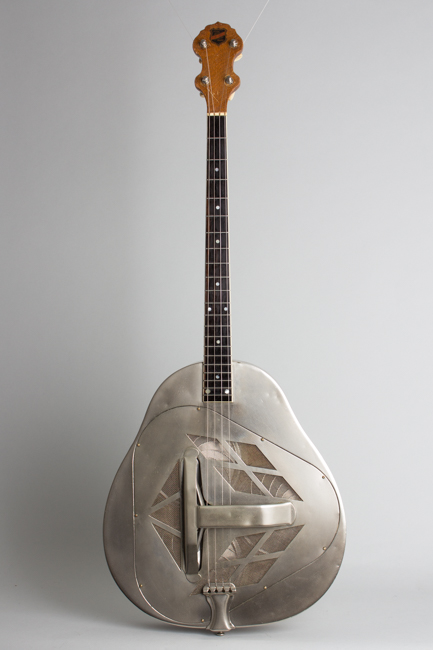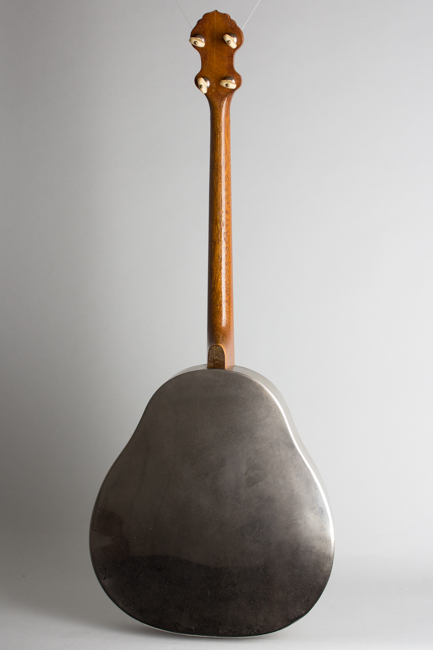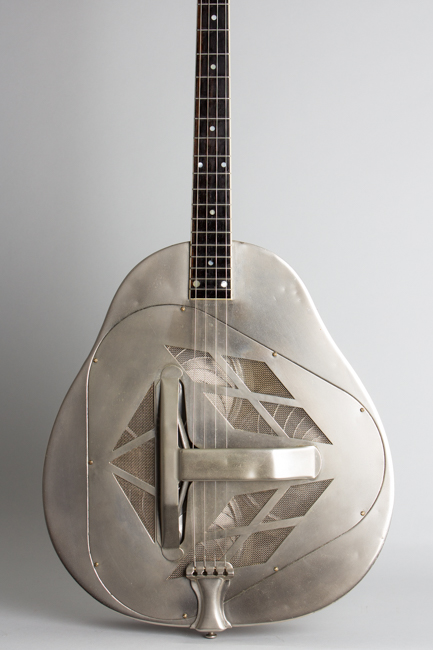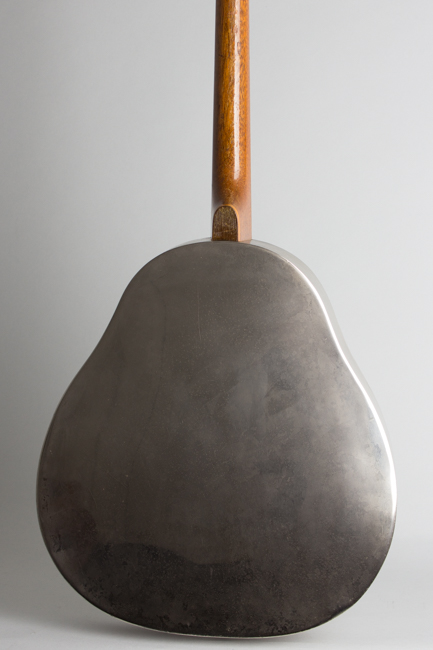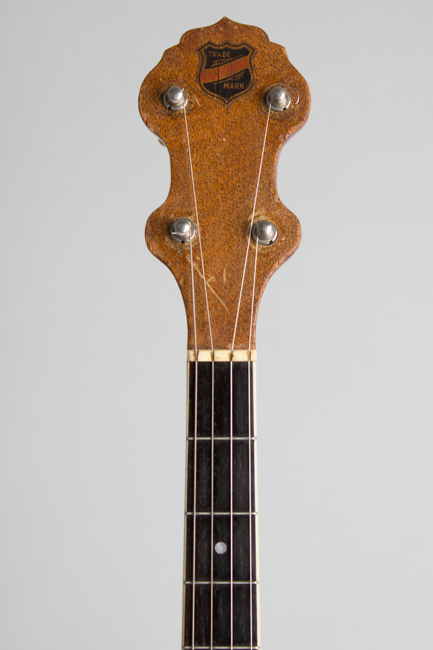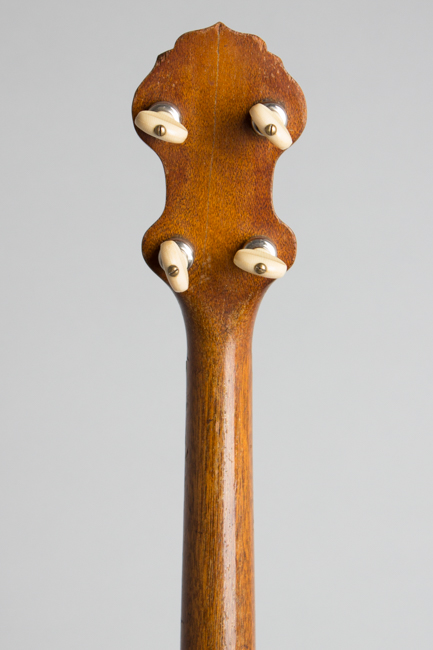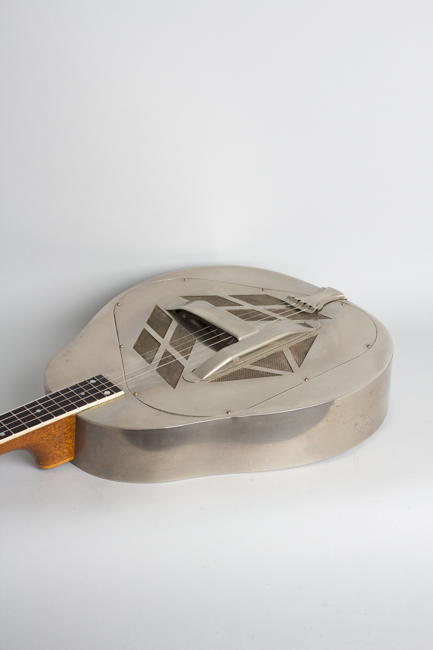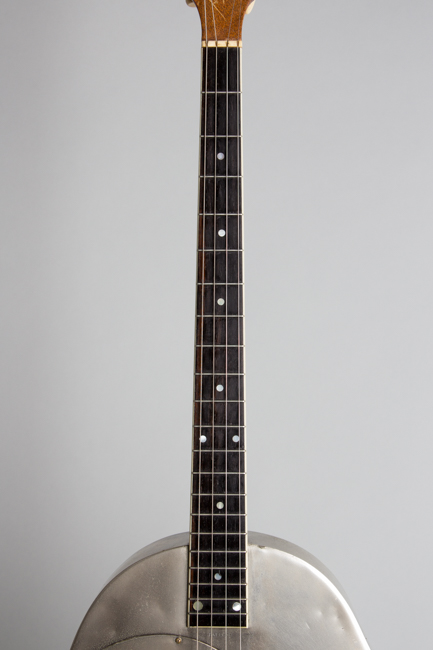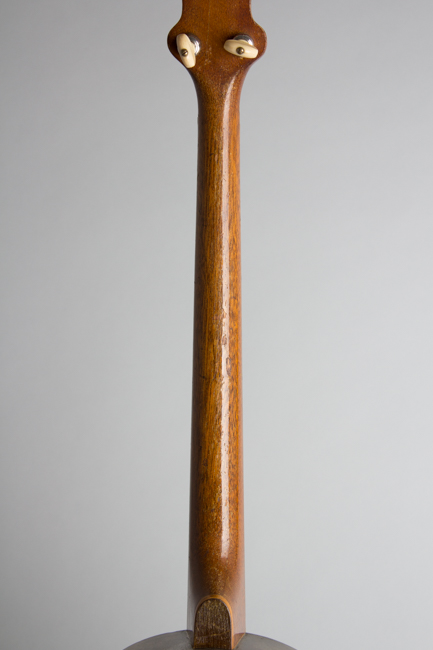National Style 1 Tricone Resophonic Tenor Guitar (1928)
This item has been sold.
Item # 9854
Prices subject to change without notice.
National Style 1 Tricone Model Resophonic Tenor Guitar (1928), made in Los Angeles, California, serial # 184, nickel plated finish, German silver body, mahogany neck, Macassar ebony fingerboard, black gig bag case.
This is a nice example of a fairly rare and somewhat forgotten National instrument, an original Style 1 Tricone Tenor guitar. The National String Instrument Corporation's first products, released in 1927, were German silver bodied Tricone Spanish and Hawaiian 6-string guitars. By 1928 National was already successful enough to expand the line to include mandolins, tenor and plectrum guitars and ukuleles all using the same triple-resonator system. The smaller dimensions of these uniquely pear-shaped 4-string bodies made assembly a difficult procedure; around 5-600 serial numbers in, the tenor and plectrum instruments were redesigned to use a single-cone resonator. Not long after the design was changed to a more conventionally guitar shaped body.
This Style 1 Tenor carries serial #184, dating to 1928 or 1929. The German silver body has three cones fitted in a well in a triangle pattern under the tri-armed bridge that activates them. The oddly-shaped body is topped by the same screen-hole coverplate used on the larger 6-string guitars, which likely dictated its eccentric dimensions. The mahogany neck has a bound ebony fingerboard with pearl dot inlay, and its topped by a somewhat bulbous banjo-style headstock. The tailpiece is a smaller version of the one used on standard guitars.
In 1928 this was a uniquely viable instrument for orchestra banjoists looking for a more guitar like sound. It is one of the very few tenor guitars that can actually compete sonically with a banjo while offering the richer Tricone tone. It excels in either the traditional tenor fifths C-G-D-A tuning or the "Chicago" style of tuning to the four higher pitches of the 6-string guitar. These were not in production for very long and are a distinct delight for the four-string player.
Overall length is 35 1/2 in. (90.2 cm.), 14 in. (35.6 cm.) wide at lower bout, and 2 15/16 in. (7.5 cm.) in depth, measured at side of rim. Scale length is 23 in. (584 mm.). Width of nut is 1 1/8 in. (29 mm.).
The instrument is structurally very sound and an excellent player, remaining in mostly original condition. The tuning pegs are 1920s Planet tuners of the type often seen on period Nationals, but other banjo-style tuners were on the instrument at some point. The nickel plated finish has a moderate level of tarnish overall, and the body shows some small dents, scratches and scuffing. The neck finish is original with some checking overall and wear to the wood along the spine. The National decal on the headstock shows a bit of pulling up off the wood but none of it has flaked away.
The only visible repair is what appears to be a very old sealed grain split running down the down back of the headstock; this does not go through to the front and there is no evidence of it on the peghead face. The ebony fingerboard has been refretted with correct style frets, which were cut through the binding but otherwise it is an excellent job. The instrument plays and sounds excellent with a very powerful tone and plenty of volume; in many ways the ideal bridge between guitar and tenor banjo. While it shows some general wear and tear this is a fine example of a fairly rare product of the original National company in Los Angeles. Excellent - Condition.
This is a nice example of a fairly rare and somewhat forgotten National instrument, an original Style 1 Tricone Tenor guitar. The National String Instrument Corporation's first products, released in 1927, were German silver bodied Tricone Spanish and Hawaiian 6-string guitars. By 1928 National was already successful enough to expand the line to include mandolins, tenor and plectrum guitars and ukuleles all using the same triple-resonator system. The smaller dimensions of these uniquely pear-shaped 4-string bodies made assembly a difficult procedure; around 5-600 serial numbers in, the tenor and plectrum instruments were redesigned to use a single-cone resonator. Not long after the design was changed to a more conventionally guitar shaped body.
This Style 1 Tenor carries serial #184, dating to 1928 or 1929. The German silver body has three cones fitted in a well in a triangle pattern under the tri-armed bridge that activates them. The oddly-shaped body is topped by the same screen-hole coverplate used on the larger 6-string guitars, which likely dictated its eccentric dimensions. The mahogany neck has a bound ebony fingerboard with pearl dot inlay, and its topped by a somewhat bulbous banjo-style headstock. The tailpiece is a smaller version of the one used on standard guitars.
In 1928 this was a uniquely viable instrument for orchestra banjoists looking for a more guitar like sound. It is one of the very few tenor guitars that can actually compete sonically with a banjo while offering the richer Tricone tone. It excels in either the traditional tenor fifths C-G-D-A tuning or the "Chicago" style of tuning to the four higher pitches of the 6-string guitar. These were not in production for very long and are a distinct delight for the four-string player.
Overall length is 35 1/2 in. (90.2 cm.), 14 in. (35.6 cm.) wide at lower bout, and 2 15/16 in. (7.5 cm.) in depth, measured at side of rim. Scale length is 23 in. (584 mm.). Width of nut is 1 1/8 in. (29 mm.).
The instrument is structurally very sound and an excellent player, remaining in mostly original condition. The tuning pegs are 1920s Planet tuners of the type often seen on period Nationals, but other banjo-style tuners were on the instrument at some point. The nickel plated finish has a moderate level of tarnish overall, and the body shows some small dents, scratches and scuffing. The neck finish is original with some checking overall and wear to the wood along the spine. The National decal on the headstock shows a bit of pulling up off the wood but none of it has flaked away.
The only visible repair is what appears to be a very old sealed grain split running down the down back of the headstock; this does not go through to the front and there is no evidence of it on the peghead face. The ebony fingerboard has been refretted with correct style frets, which were cut through the binding but otherwise it is an excellent job. The instrument plays and sounds excellent with a very powerful tone and plenty of volume; in many ways the ideal bridge between guitar and tenor banjo. While it shows some general wear and tear this is a fine example of a fairly rare product of the original National company in Los Angeles. Excellent - Condition.
